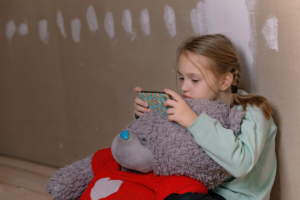
Being educated on mental health issues among children is becoming more prevalent in today’s society. Anxiety is a normal part of life, but when it becomes overwhelming and persistent, it can negatively impact a child’s well-being. Identifying signs of anxiety in children at a young age is crucial for early intervention and support.
In addition to physical health, we focus on positive mental health at HealthPark Pediatrics as well. We will explore common signs of anxiety in young children and discuss the importance of recognizing and addressing these concerns.
Signs of Anxiety in Children:
- Changes in Behavior: Children often express anxiety through changes in behavior. Pay attention to shifts in their usual patterns. For instance, a once outgoing child may become more withdrawn, avoiding social interactions or playtime with peers. On the other hand, a typically reserved child might display more clinginess or dependency on caregivers.
- Physical Symptoms: Anxiety can manifest in physical symptoms. Young children may not always have the vocabulary to express their feelings, so pay attention to bodily cues. Common physical signs include stomachaches, headaches, muscle tension, and fatigue. Frequent complaints about feeling unwell, especially without any apparent illness, might be indicative of underlying anxiety.
- Sleep Disturbances: Changes in sleep patterns are another red flag for anxiety in children. This could include difficulty falling asleep, frequent waking during the night, or nightmares. A child who is anxious may also exhibit restlessness during sleep, such as tossing and turning.
- Academic Challenges: Anxiety can impact a child’s ability to concentrate and perform academically. If a child who previously enjoyed school suddenly starts expressing reluctance or fear about going to school, or if there is a noticeable decline in academic performance, it might be a sign of underlying anxiety.
- Excessive Worrying: While it’s normal for children to worry from time to time, excessive worrying about various aspects of life can be a sign of anxiety. This may include persistent fears about safety, health, or separation from caregivers. Listen attentively to what the child is expressing and take note of recurring themes in their worries.
- Perfectionism: Some anxious children develop perfectionistic tendencies as a way to cope with their anxiety. They may be overly concerned about making mistakes or seeking constant reassurance. These behaviors can contribute to a cycle of anxiety, as the child’s fear of imperfection may lead to increased stress and anxiety.
- Avoidance Behavior: Children with anxiety may engage in avoidance behaviors to cope with their fears. This could involve avoiding certain activities, places, or social situations that trigger anxiety. Pay attention to patterns of avoidance and assess whether they are impacting the child’s daily life.
Get In Touch With Us:
Recognizing signs of anxiety in young children is crucial for providing timely support and intervention. By understanding these common indicators, parents, teachers, and caregivers can play a vital role in promoting the mental health and well-being of children. If you notice persistent signs of anxiety in a child, it is advisable to seek professional guidance from pediatricians, psychologists, or counselors who specialize in child and adolescent mental health.
Creating a supportive and open environment where children feel comfortable expressing their feelings is key to addressing anxiety and fostering emotional resilience from a young age. If you feel comfortable speaking with one of our physicians, contact us at 919.896.7066.









